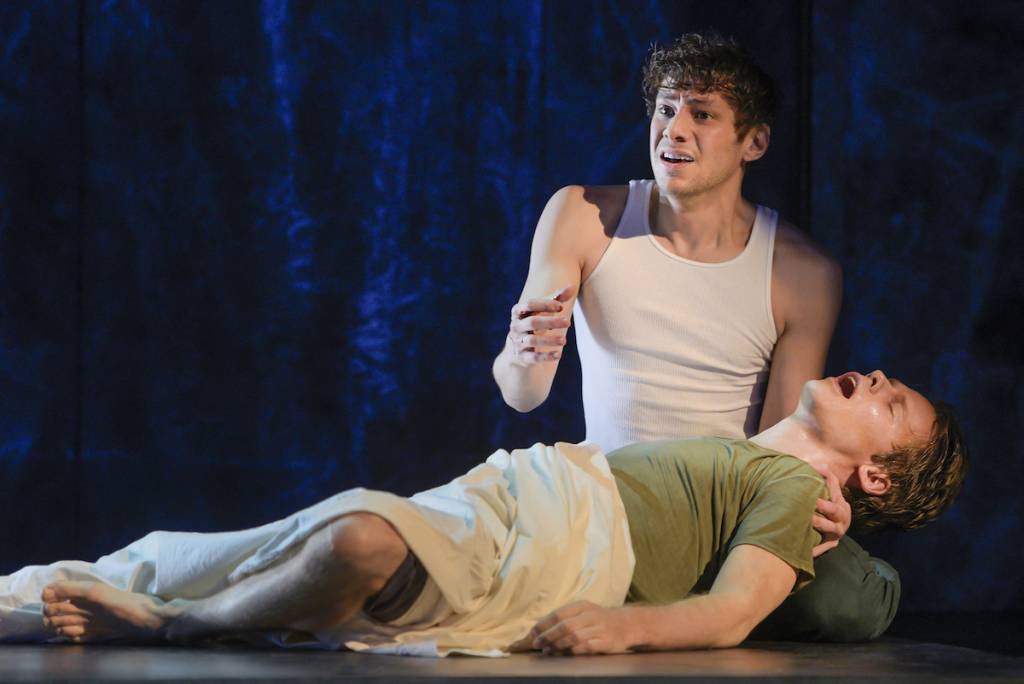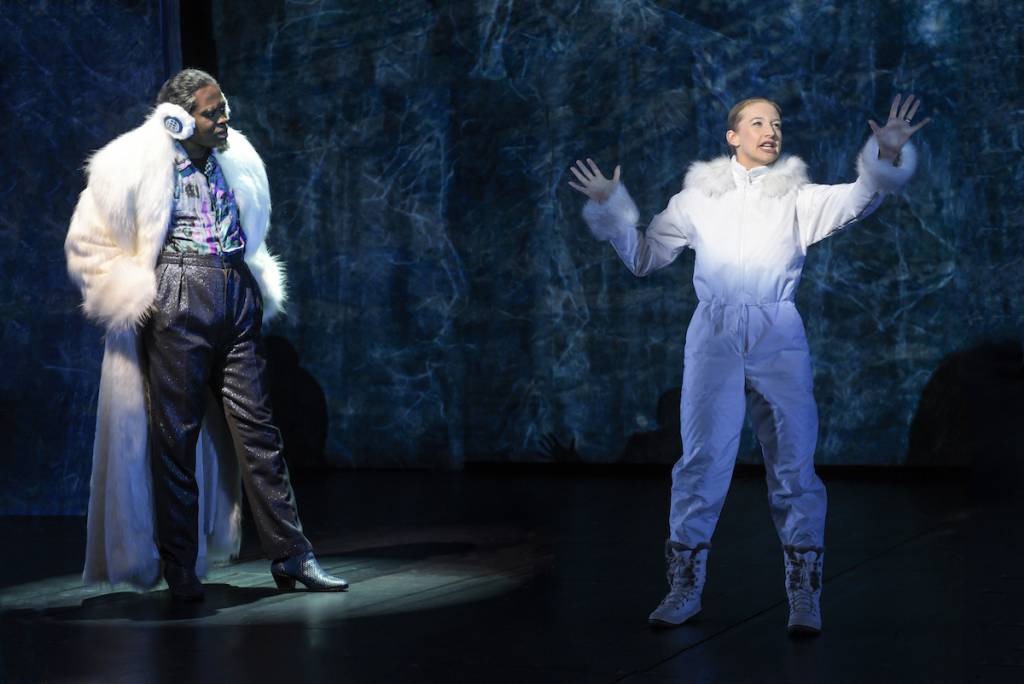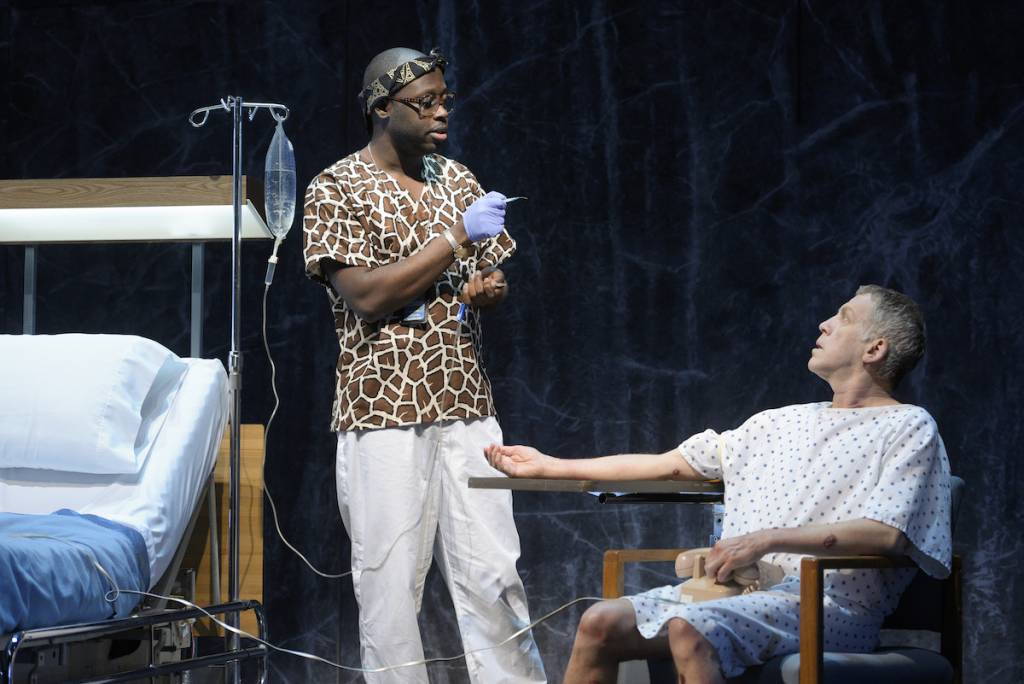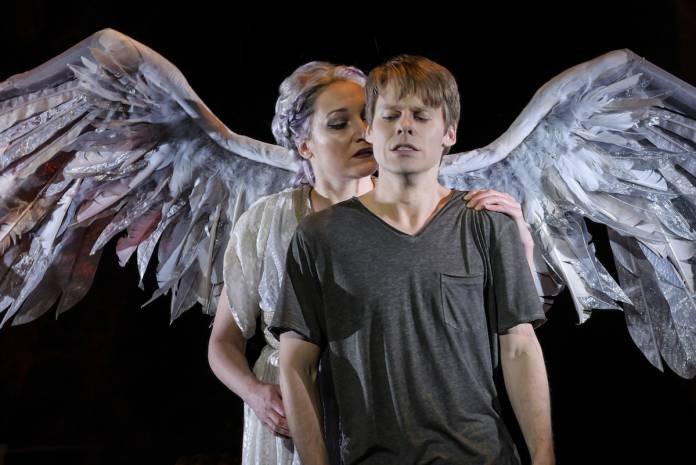ONSTAGE “Why is Angels in America still the most prominent story being told about AIDS?” asked a wonderfully provocative essay about the epic early ’90s play by Tony Kushner, as a critically lauded revival was being mounted on Broadway—and one was preparing to launch here, at the Berkeley Rep (through July 22).
The essay delves into the racial politics—or rather lack of them—when it comes to the play’s two black characters, nurse Belize and Mr. Lies, and also lays out the number of good plays addressing AIDS that haven’t been similarly burned into our consciousness (unlike movies, which have given us constant community conversation fodder from the sappy Philadelphia to last year’s sublime BPM).
I couldn’t help think about that essay as I strapped myself in at the Rep for the seven-and-a-half hour marathon of the play’s two parts: “Millennium Approaches” and “Perestroika.” (The length is really just a blip in our binge-watching era.) Despite its New York City setting and famous inaugural Broadway run in 1993, much of Angels was written just north of San Francisco, in the gay vacation stronghold of the Russian River area, and was commissioned by SF’s Eureka Theatre co-artistic directors Oskar Eustis and Tony Taccone. It played here for a trial run, after debuting in LA and before moving on to Broadway.

Taccone is directing this revival, and the play itself turns out to be a love letter to the beauty and ideal of San Francisco, which stands in for heaven (although full of apocalyptic inequality, prophetically enough). So this return of Angels seems like a reckoning on home turf: How much relevance does this 25-year-old “Gay Fantasia on National Themes,” as the subtitle puts it, hold in an age when diversity, intersectionality, and social realism, at least thematically, are prized?
Well, for one, holy hell: The political issues of the 1980s that envelope the characters in this brilliant production, from religious bigotry and conservative bullying to overmedication for mental illness and, yes, racial condescension, are just as pertinent and searing today—right down to the inclusion as a major player of Roy Cohn, aka Donald Trump’s lawyer-mentor (fiercely played here by Stephen Spinella, who originally played main character Prior Walter in the play’s Broadway debut). If anything the play is less a time capsule than a ripped-from-the-headlines episode of America: SVU.
Aided by Taccone’s breathless yet sensitive direction, the heroic cast of eight turns this sprawling work—which follows a handful of human characters plus one particular angel through the cruisey bushes of Central Park and gilded offices of Washington to the North/South Pole and the afterlife itself—into a enthralling ensemble piece that whisks by, aided by an eye-popping, no-expenses-spared production utilizing moving platforms and lovely digital flourishes. (It also remains resolutely clunky when the script calls for it: Kushner’s divine machinations are rooted both in vaudevillian charm and doubts about technology. There’s good reason the angel struggles hilariously with her onstage flying contraption.)
Along the way, we plumb the depths of human betrayal and heights of ecstatic deception: a hyper-sensitive gay Jewish intellectual, Louis (Benjamin T. Ismael, nailing the type) leaves his HIV-positive lover, the Mayflower-descended visionary Prior Walter (a touching Randy Harrison) when he gets sick. Meanwhile, a Mormon housewife, Harper (Amaty Pitt, vibrant), is over-medicating herself in an attempt to overlook vital truths about her career-climbing husband (Danny Binstock, hunky). Slithery Reagan operative Roy Cohn, desperately hiding his AIDS diagnosis from the world, starts seeing the ghost of Ethel Rosenberg, who he helped electrocute for treason decades ago—but don’t think that means a change of monstrous heart is in order.

Throw into all this is a swath of gorgeously poetic writing, political outbursts, bitingly humorous interventions from a heavenly Empyrean in disarray, Soviet speeches, Hebrew prayers, nuclear meltdowns, a goofy twist on “A Christmas Carol,” and a nosy mom from Utah, and it’s all a sublime rollercoaster through America’s psyche, informed equally by rage, wonder, and theatrical chutzpah. Nothing is impossible in this play: psychic connection (characters appear in each others’ dreams/hallucinations), astral projection, jolting glossolalia, bold prophecy, absurd reversals, achingly tender mercies, angelic orgasms, and even, most unspeakable of all at the time the play was written, surviving AIDS. In Angels in America, the main plot device is the sheer audacity of Kushner’s boundary-erasing imagination.
And yes, despite Kushner’s continued tinkering throughout the years, both the surreal travel guide Mr. Lies and the pivotal character of Belize, the no-nonsense nurse who saves the day, still technically fall under the category of Magical Negro, allotted no real trajectory or backstory, a device for the other characters to grow through. (In fact, as I was noticing that the only real detail of Belize’s history in the play is that he was Prior’s ex-boyfriend, I realized how much Kushner left out of the play, including the hovering specter of how almost all of the characters were surely infected with HIV.)
I will say that the fact that the characters are played by the incredible Caldwell Tidicue, aka Bob the Drag Queen (squee!)—known to many from RuPaul’s Drag Race, but long a formidable force on the NYC scene—brings both believable humanity to Belize and inside-knowledge surreality to Mr. Lies. (You can’t be a drag queen and not know how to to work a fabulous outfit and outsize personality.) Belize did not seem more caricature than person; he seemed fully aware of, and enervated by, the way society/this play shoved him into a few acceptable, stereotypical roles.
One scene in particular plays so sharp nowadays: At a coffeeshop meeting, Louis drones on endlessly and neurotically (he too is a stereotype) to Belize about current politics, talking both over and for Belize. Tidicue’s face expertly telegraphs the frustration and fatigue a black person can feel in such liberal “conversations,” and Belize’s ultimate refusal to be spoken for felt profound, even as, of course, it ultimately fell on him to educate someone on the limits of their experience.

When Angels in America came out in 1993, I had buried three close friends, been loudly kicked out of my doctor’s office after asking about STD prevention, and was prepping my best friend for the inevitability of both his legs being amputated “due to complications from HIV/AIDS” (a phrase almost talismanic in its thrice-removedness from the horror at hand). I was 23. I was also living in Detroit, cordoned off by geography and economics from the roiling protests of ACT-UP in the big cities, the gritty artistic uprisings in downtown NYC.
When I heard about the play—because the pre-Internet gay grapevine was in full effect on this one—the idea that an epic, hyper-poetic, quasi-religious manifesto that spoke essential truths about contemporary gay life (including the racism) could break records and score multiple Tonys was almost alarming. Are you kidding? It wasn’t until I moved to San Francisco that I got my hands on a copy of the script. At first I, like many of my friends, was upset that there wasn’t more gay stuff in it. In an era of so much silencing about our plight and rights, we wanted this historical work to be ours and ours alone.
Seeing the play 25 years later, I realize that this was a necessary reaction for the time, but also a demand that would have tethered the universal reach of this work to the earthly realm of narrow sociological disquisition. (Mush like the fate that befell Boys in the Band, also now on Broadway.) Kushner’s most audacious trick was to centralize one of the rawest moments of gay existence in a timeless story of heaven, hell, and all that lies between.
ANGELS IN AMERICA
Through July 22
Berkeley Rep
Tickets and more info here.







